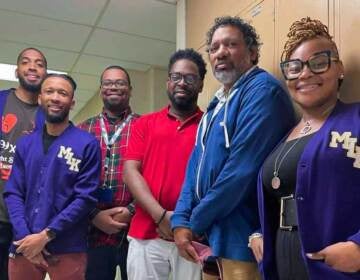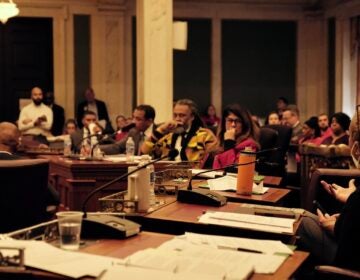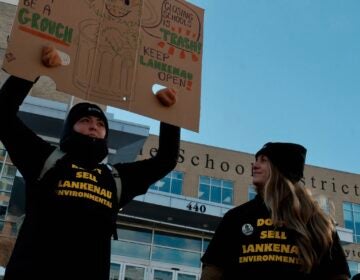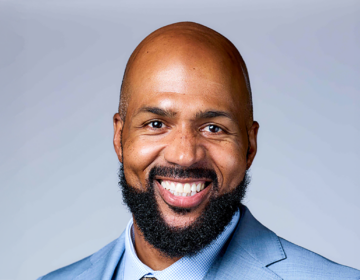Philadelphia unveils ‘21st Century’ workforce initiative at three high schools
The 21st Century Schools Model will focus on the entertainment, development, and transportation industries.
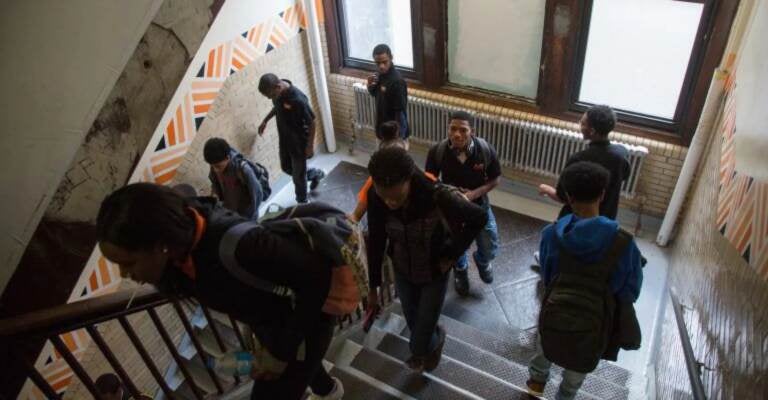
Students pass through a stairwell at Overbrook High School. The school is one of three that will participate in the district’s 21st Century Schools Model initiative where students will pursue workforce training in specific fields related to local needs and interests. (Emily Cohen for WHYY)
This story originally appeared on Chalkbeat Philadelphia
Starting next year, students at three neighborhood Philadelphia high schools will be able to pursue workforce training in specific fields related to local needs and interests.
Students at Overbrook High School will be able to get certifications and internships in the entertainment industry. At nearby West Philadelphia High School, the focus will be urban development and real estate. And at Bartram High School in southwest, an area of the city lined with car dealerships and repair centers on the main road to Philadelphia’s airport, students will concentrate on the automotive, logistics, and transportation industries.
They will do this through partnerships with local organizations and companies. Teachers will also be trained to augment the curriculum with “blended instruction,” activities, and hands-on experiences in the areas of focus. The district’s aim is to help students see and create closer connections between the work they do in schools and their postsecondary careers.
The program, called the 21st Century Schools Model, will provide “life-changing opportunities and life-changing outcomes for students and their families,” Superintendent Tony Watlington said during a Thursday press conference at Overbrook.
Watlington described the initiative as a key part of achieving his goal to make Philadelphia the fastest-improving large school district in the nation regarding student achievement. Watlington noted that the district’s open enrollment policy allows students outside the schools’ catchment to enroll if this pathway interests them.
“Schools share the responsibility to help companies recruit, onboard, support, and develop the talent, namely our students,” he said. “In order to build a healthy, diverse and more equitable pipeline of skilled labor that supports both our local economy and economy of the future, we need pipelines like this that provide our young people with the instruction, awareness, exposure and experience to support whatever pathway they choose when they graduate.”
However, he added, while he believes that talent is equally distributed among Philadelphia students, “access and exposure to resources are not equitably distributed.”
The district also wants to eventually expand the program to other neighborhood high schools in the city, he said.
Officials at Thursday’s press conference did not provide a price tag for the 21st Century Schools Model. They also stressed that students participating in the new model will still need to accumulate the 23.5 credits required for high school graduation, and the goal is for all of them to be ready for college as well as careers.
Ali Robinson-Roberts, the district’s deputy chief of postsecondary readiness, said the program allows students to make a closer connection between the work they do in school and their future careers, combining “student engagement with academic rigor.”
Overbrook Principal Kahlila Johnson, herself a 1989 graduate of the school, said that Overbrook — the actor Will Smith’s alma mater — already has partnerships with several local companies and organizations. These include DASH, a nonprofit that exposes students to the entertainment industry; Live Nation and Live Nation Urban, which run entertainment venues; and the Mann Center for the Performing Arts.
The new model, she said, would help the school seek out and develop more such partnerships.
Johnson said experiences Overbrook already provides also increase students’ desire to attend school, which has a “rich history” in music and the arts and is a beacon for the community looking to provide students access to those fields.
Students will also be able to attain various industry certifications through 21st Century Schools, such as Apple Logic, which can turn an Apple computer into a recording studio. (Thursday’s press conference was held in Overbrook’s digital media lab.) Such opportunities will help industries to look at students as assets to their work once they graduate, Johnson said.
Through this new program, “We will be exposing students to more facets of the entertainment society in hopes of closing the opportunity gap here in West Philadelphia,” Kahlila Johnson said.
Philadelphia has a tiered system of high schools that includes neighborhood schools, citywide admission schools, and selective admission or criteria-based schools that have admissions requirements.
Some of the selective admission and citywide admission schools focus on certain fields, such as the High School of Creative and Performing Arts and the George Washington Carver High School of Engineering and Science.
The district has made previous efforts to expand its technical education offerings and workforce training programs into neighborhood schools. Swenson Skills Center is connected with Lincoln High School, and Benjamin Franklin High School in North Philadelphia has an advanced manufacturing program.
The citywide admission schools include Mastbaum, Dobbins, and Randolph, which were created as vocational/technical schools focusing on skilled trades that have since evolved to expand and modernize their offerings to meet local industry needs.
This year, for the first time, the district also opened up summer job opportunities to seventh and eighth graders in fields like construction to introduce them to possible pathways in high school.
Altogether, there are 43 workforce specialization areas in schools around the city, including culinary arts, digital media production, sports marketing, and automotive technology.
The 21st Century Schools Model initiative is separate from the district’s main career and technical education infrastructure, officials said.
West Philadelphia Principal Marla Travis, who was once a guidance counselor, said that students in her school had asked about career options that don’t require four years of college, such as real estate, which was adopted as her high school’s focus.
And Bartram Principal Brian Johnson emphasized that the focus in his school on the automotive, transportation, and logistics industries will go far beyond the traditional offerings in vocational programs such as car repair.
“We have a variety of logistics and automotive industries right outside of our walls, so having this type of advanced pathway in our school provides students with the option of securing work in these fields,” Brian Johnson said.
WHYY is your source for fact-based, in-depth journalism and information. As a nonprofit organization, we rely on financial support from readers like you. Please give today.


